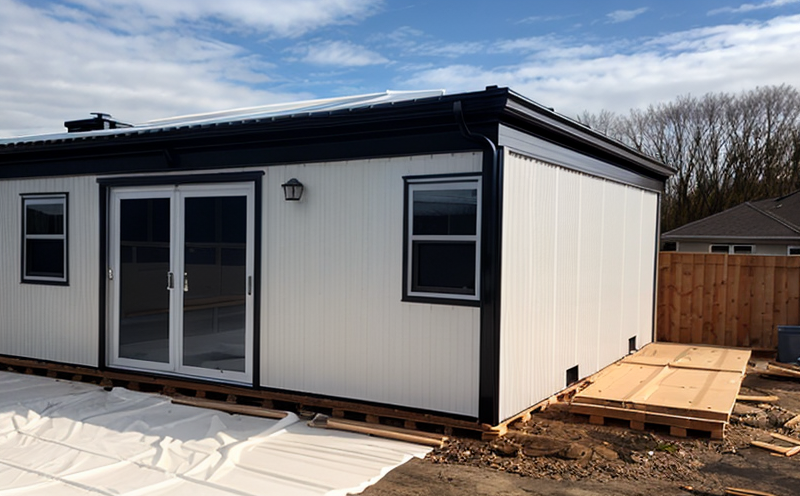ISO 6946 Building Component Thermal Resistance Testing
The ISO 6946 standard outlines a comprehensive approach to assessing the thermal resistance of building components, which is critical for ensuring energy efficiency and compliance with international standards. This testing procedure evaluates the insulating properties of materials used in construction, such as insulation boards, panels, and other building envelope components.
The process involves the measurement of the thermal resistance (R-value) of a material or assembly under controlled conditions. The test aims to determine how well the component resists heat flow through it when subjected to specified temperature differences across its thickness. This is particularly important for ensuring that buildings are thermally efficient, thereby reducing heating and cooling costs.
The ISO 6946 testing procedure involves a thermal chamber where the specimen is placed between two walls with controlled temperatures at each side. The heat flow through the test specimen is measured using various instruments, including calorimeters or other appropriate devices that can accurately measure energy transfer. The data collected during this process allows for precise determination of the thermal resistance values.
Specimens are typically prepared in accordance with ISO 6946 guidelines to ensure accurate testing results. This includes ensuring the correct dimensions and thicknesses, as well as the presence or absence of any adhesives or additional materials that might affect the test outcome. After preparation, the specimens are placed into a thermal chamber where they undergo steady-state heat flow tests.
The apparatus used in this testing typically includes a calorimeter for measuring the heat flux through the specimen and a temperature measurement system to monitor the temperatures at both ends of the specimen. These instruments must be calibrated regularly to ensure accuracy, as any deviation could lead to incorrect thermal resistance values.
- Calorimeters are used to measure the heat flow across the specimen.
- Temperature measurement systems provide accurate readings of the temperatures at both ends of the specimen.
- Environmental control units maintain consistent ambient conditions within the thermal chamber.
- Data acquisition systems collect and analyze all relevant data points during testing.
The acceptance criteria for this test are based on achieving a specified R-value, which is determined by the intended use of the building component. For example, if a particular insulation board is designed to be used in an area requiring high thermal resistance due to extreme weather conditions, it must meet or exceed the specified R-value as per ISO 6946.
Test results are typically reported in terms of thermal conductivity (λ) and thermal resistance (R). These values provide a clear indication of the material's ability to resist heat flow. Reporting should include all relevant parameters such as the type of specimen tested, its dimensions, the temperature conditions used during testing, and any other factors that may have influenced the results.
Understanding the significance of this test is crucial for quality managers, compliance officers, R&D engineers, and procurement professionals involved in building construction. It helps ensure that all components meet the necessary standards for energy efficiency, thereby contributing to sustainable development goals.
Eurolab Advantages
Eurolab offers unparalleled expertise in ISO 6946 building component thermal resistance testing. Our team of highly qualified professionals ensures that each test is conducted with precision and reliability, adhering strictly to international standards.
- Accurate Results: We use state-of-the-art equipment calibrated regularly to ensure accuracy in all measurements.
- Compliance Assurance: Our tests are designed to meet the strictest compliance requirements, helping you avoid costly non-compliance issues.
- Expertise and Experience: Our team has extensive experience in conducting these types of tests across various sectors.
- Quality Control: We provide comprehensive quality control measures to ensure the integrity of your testing process.
Eurolab's commitment to excellence and customer satisfaction ensures that you receive reliable test results every time. By choosing Eurolab, you can be confident in the accuracy and reliability of our services, which are essential for maintaining high standards in building component thermal resistance testing.
Quality and Reliability Assurance
- Data Accuracy: Our tests are conducted using precision instruments that are regularly calibrated to ensure accurate data collection.
- Consistent Results: Reproducibility is key in our testing process, ensuring consistent results across multiple trials.
- Comprehensive Reporting: Detailed reports are provided with all relevant parameters and findings for easy reference.
- Customer Support: Our team is always available to provide assistance and support throughout the testing process.
International Acceptance and Recognition
The ISO 6946 standard for building component thermal resistance testing is widely recognized globally. This ensures that test results are accepted by regulatory bodies across different countries, promoting consistent quality standards worldwide.
Eurolab's commitment to adhering strictly to international standards such as ISO 6946 guarantees the acceptance and recognition of our test results by various stakeholders. We understand the importance of this for building component manufacturers, architects, and construction professionals who rely on accurate thermal resistance data to make informed decisions.
The global reach of ISO standards means that our clients can trust in the reliability and consistency of their testing results, which is crucial for international projects or when seeking certifications across different regions.





